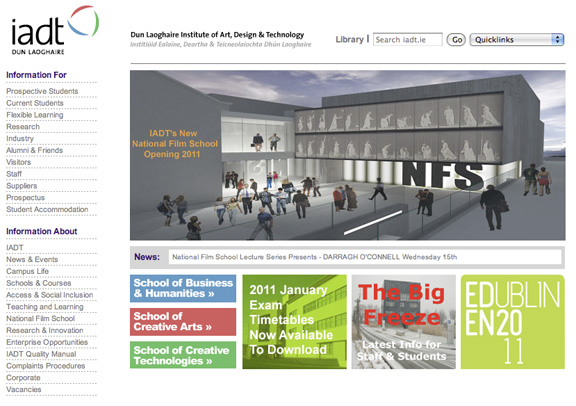Home » Emerging Media » Coding: Even Knowing A Little Can Help You Alot
Coding: Even Knowing A Little Can Help You Alot

When I first started graduate school at the University of Texas at Dallas, my intention was to shift my career from being a graphic designer to a web designer. After teaching myself the basic foundations of web design codes for putting together websites, I realized that I’m not that good at coding.
I get really intimidated everytime there is something new introduced to add functionality and design to web building. I’m more of a GUI person, which makes graphic design programs like Photoshop and video editing programs like Final Cut easy to learn. Everything is about selecting, dragging and dropping and from there your creativity starts. However, when it comes to coding, alot of mistakes can occur even from the beginning. Things may not look how the way you want it and you have to go back into HTML or CSS to find it, different browsers may display your website differently, and text and images may not align right. These are some of the obstacles that I experienced when building my first website and this caused me to question my career path, but I pressed forward and just forced myself to learn more and more.
Even after spending hours of studying books, watching video tutorials and experimenting with code, I still can’t build a site from scratch but I now have the general knowledge of how web codes work and how they help develop a website’s navigation, layout, links, seo and multimedia. This definitely helps alot, especially when you’re working on a team or even in project management. The good news for you all who still wants to get into web building, CMS or Content Management System is the perfect solution.
Using CMS allows you to build websites with little or no coding and it gives your client the power to easily edit their own contents so you can move on to your next project. There are several CMS platforms that you can choose from, both free or paid, but it’s up to you to choose which will work for you and your projects. The most mainstream CMS platforms out there are WordPress, Joomla, and Drupal. I like working in WordPress becuase they offer hundreds of pre-made themes, plugins and online support if you come across with a problem that needs solving and you can tweak the CSS or PHP code for your personal preference. I’m also going to start experimenting with another CMS platform call Concrete 5 because it has a very simple interface that you can interact it without going deep into the code, easier for you and your client.
So you decided to work with a CMS platform, what’s next? I suggest studying the CMS homepage, work with a demo and review comments to see if it is the right one for you. I also recommend going on Twitter and follow web designers who are using CMS and ask them questions, they’re more than happy to help. Also, study all the codes being used for site building. Right now, HTML, CSS, PHP, Javascript (Jquery) and MySQL are the codes used by CMS. Just have an understanding how each one works and keep studying because codes tend to upgrade. For example, HTML and CSS is moving toward HTML 5 and CSS 3 for greater web interactivity. Normally, I use lynda.com to study the video tutorials and I always go back to it when I have an issue. You can also just Google the codes and you’ll be presented with hundreds of online tutorials and videos to study from. If you prefer one-on-one sessions, you can search for a junior college near your area that offers web design courses and certification degrees, you can even attend classes online if you don’t have the time.
Once you grasp the fundamentals of web coding, put it to practice. Offer to build a website for a friend or for somebody online as volunteer work, that way you can experiment with the codes through trial and error. I worked on my first client’s blog site in WordPress and just tweaked the codes to align some images and added plugins to help with online searchability, awesome experience!
From there, just PRACTICE PRACTICE PRACTICE. The more you do the better you become. Keep studying up to date codes, join in online forums and ask questions, attend local workshops on your CMS, and build a community of web designers and coordinate with one another. Even if you decided that web design isn’t your forte, your experience can still be vital in web design and social media projects when inputs are needed.
For any web designers, what are your thoughts on studying web codes?
Related articles
- 3 Free To Use Great Tools For Web Designers (smashingapps.com)
- Responsive Web Design: A New Dimension in Web Design and Development Arena (pixelcrayons.com)
- The Future of Web Design (thenextweb.com)
- 5 Inspired Places to Find a Job in Web Design (inspiredm.com)
-
Pingback: Coding Taught To Young Students May Lead To Tech Innovations




